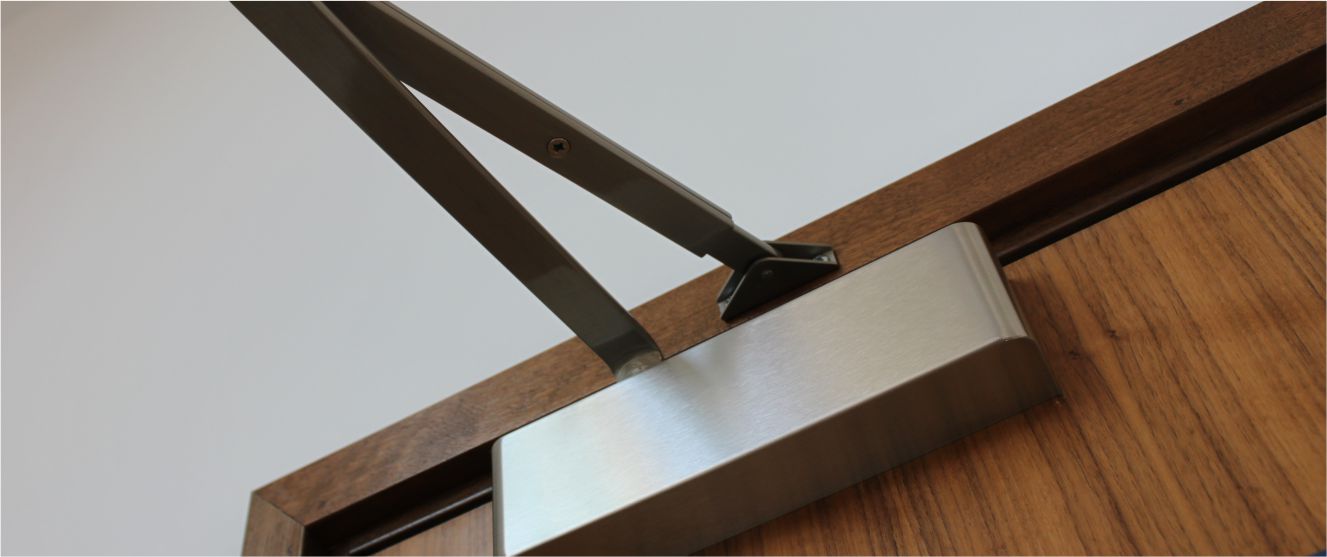Hydraulic vs pneumatic door closers - what is the difference?

The door closer performs a very important function in a building, and there are many different types to choose from. But most door closers fall into one of two categories; a hydraulic or pneumatic door closer. In many ways, these are very similar, in that they each use a specific substance to control the door’s operation, but they achieve this in a slightly different way and also perform the opening and closing action very differently. So here we will study what a hydraulic and pneumatic door closer is and explain what the important differences are.
What is a hydraulic door closer?
A hydraulic door closer uses a type of oil (commonly known as hydraulic oil) to control the operation of the door and the rate in which it opens and closes. This fluid will flow through the chamber of the door closer mechanism and this creates a resistance to slow the operation of the door down. This resistance can be adjusted according to your needs.
What is a pneumatic door closer?
The pneumatic door closer uses air pressure to control the operation of the door. This is air that is compressed into a tubular chamber when the door is opened, and then released when the door is closed. Again, this rate of release can be adjusted, which enables the user to control the speed at which the door is opened and closed.
What are the key features of a hydraulic door closer?
Operation – The hydraulic oil used by a hydraulic door closer results in the door operation being smoother and more consistent than with a pneumatic door closer. You can achieve more control with a hydraulic door closer.
Durability – You should achieve more durability from a hydraulic door closer because it has a better weather resistance, and is suitable for all types of door.
Maintenance – Oil can be a difficult substance to work with and may also need to be replenished from time to time. The door closer will also have oil seals within its design, and these can become worn, resulting in oil leaks. The oil seals will need replacing occasionally.
Where would you use a hydraulic door closer? A hydraulic door closer can be used in residential and commercial buildings because it is suitable for a wider range of doors, from light doors to heavy doors. Also, its good weather resistance qualities means it is also suitable for exterior doors.
What are the key features of a pneumatic door closer?
Operation – A pneumatic door closer is capable of a much faster opening and closing speed, due to the use of compressed air, however this is not as smooth and consistent as a hydraulic door closer.
Durability – The pneumatic door closer is susceptible to temperature change and hence is less durable, particularly in locations where there are frequent fluctuations in weather conditions.
Maintenance – There are very few maintenance checks required with a pneumatic door closer, other than periodically checking the air pressure.
Where would a pneumatic door closer be used? A pneumatic door closer is a much simpler design than a hydraulic door closer, and because it opens and closes the door much faster, it is more suitable to locations where this speed is important. That would normally be for security or energy efficiency reasons, ie. the door closes quickly so that unauthorised personnel can’t enter through it, and warm air can’t escape while cold air can’t circulate. The pneumatic door closer is only really suitable for lighter doors as the compressed air function isn’t as powerful or able to exert as much control as the hydraulic door closer.
So in summary, the difference between hydraulic and pneumatic door closers is that one uses hydraulic oil to control the door and the other uses compressed air. Hydraulic door closers enable a smoother and more consistent operation with maximum control, while pneumatic door closers operate much faster. And while hydraulic door closers are suitable for all types of door, they are particularly suitable for exterior doors because of their weather resistance capability. Meanwhile, pneumatic door closers are less heavy duty and are only really suitable for lighter doors.
Check out our range of door closers at MB Direct
At MB Direct we have a wide range of door closers of both hydraulic and pneumatic design. All our door closers are capable of consistent and reliable operation and you can choose a door closer based on the specific needs of your building design. So check out our range of door closers and order online today.